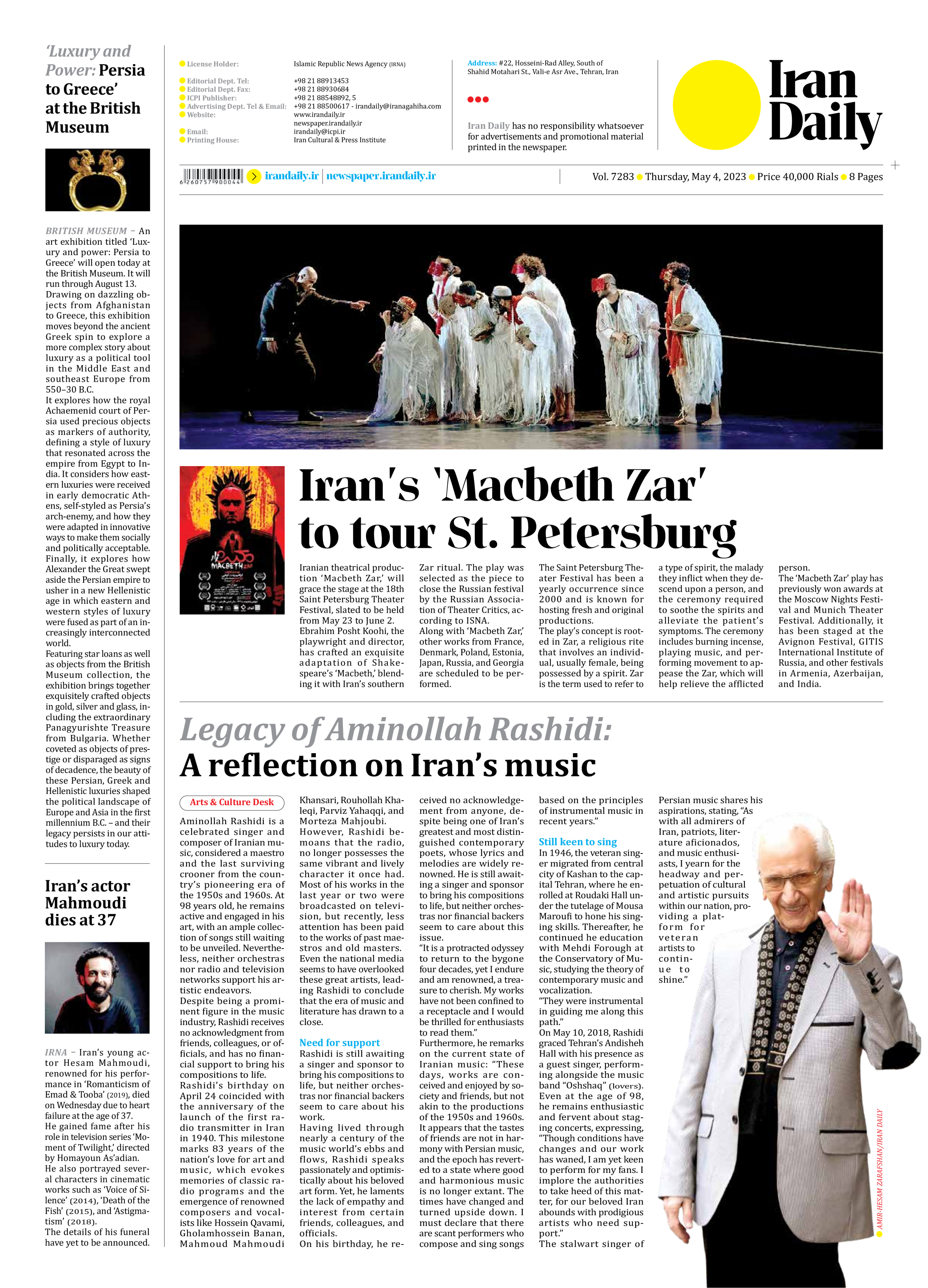
Legacy of Aminollah Rashidi: A reflection on Iran’s music
Aminollah Rashidi is a celebrated singer and composer of Iranian music, considered a maestro and the last surviving crooner from the country’s pioneering era of the 1950s and 1960s. At 98 years old, he remains active and engaged in his art, with an ample collection of songs still waiting to be unveiled. Nevertheless, neither orchestras nor radio and television networks support his artistic endeavors.
Despite being a prominent figure in the music industry, Rashidi receives no acknowledgment from friends, colleagues, or officials, and has no financial support to bring his compositions to life.
Rashidi’s birthday on April 24 coincided with the anniversary of the launch of the first radio transmitter in Iran in 1940. This milestone marks 83 years of the nation’s love for art and music, which evokes memories of classic radio programs and the emergence of renowned composers and vocalists like Hossein Qavami, Gholamhossein Banan, Mahmoud Mahmoudi Khansari, Rouhollah Khaleqi, Parviz Yahaqqi, and Morteza Mahjoubi.
However, Rashidi bemoans that the radio, no longer possesses the same vibrant and lively character it once had. Most of his works in the last year or two were broadcasted on television, but recently, less attention has been paid to the works of past maestros and old masters.
Even the national media seems to have overlooked these great artists, leading Rashidi to conclude that the era of music and literature has drawn to a close.
Need for support
Rashidi is still awaiting a singer and sponsor to bring his compositions to life, but neither orchestras nor financial backers seem to care about his work.
Having lived through nearly a century of the music world’s ebbs and flows, Rashidi speaks passionately and optimistically about his beloved art form. Yet, he laments the lack of empathy and interest from certain friends, colleagues, and officials.
On his birthday, he received no acknowledgement from anyone, despite being one of Iran’s greatest and most distinguished contemporary poets, whose lyrics and melodies are widely renowned. He is still awaiting a singer and sponsor to bring his compositions to life, but neither orchestras nor financial backers seem to care about this issue.
“It is a protracted odyssey to return to the bygone four decades, yet I endure and am renowned, a treasure to cherish. My works have not been confined to a receptacle and I would be thrilled for enthusiasts to read them.”
Furthermore, he remarks on the current state of Iranian music: “These days, works are conceived and enjoyed by society and friends, but not akin to the productions of the 1950s and 1960s. It appears that the tastes of friends are not in harmony with Persian music, and the epoch has reverted to a state where good and harmonious music is no longer extant. The times have changed and turned upside down. I must declare that there are scant performers who compose and sing songs based on the principles of instrumental music in recent years.”
Still keen to sing
In 1946, the veteran singer migrated from central city of Kashan to the capital Tehran, where he enrolled at Roudaki Hall under the tutelage of Mousa Maroufi to hone his singing skills. Thereafter, he continued he education with Mehdi Forough at the Conservatory of Music, studying the theory of contemporary music and vocalization.
“They were instrumental in guiding me along this path.”
On May 10, 2018, Rashidi graced Tehran’s Andisheh Hall with his presence as a guest singer, performing alongside the music band “Oshshaq” (lovers). Even at the age of 98, he remains enthusiastic and fervent about staging concerts, expressing, “Though conditions have changes and our work has waned, I am yet keen to perform for my fans. I implore the authorities to take heed of this matter, for our beloved Iran abounds with prodigious artists who need support.”
The stalwart singer of Persian music shares his aspirations, stating, “As with all admirers of Iran, patriots, literature aficionados, and music enthusiasts, I yearn for the headway and perpetuation of cultural and artistic pursuits within our nation, providing a platform for veteran artists to continue to shine.”







